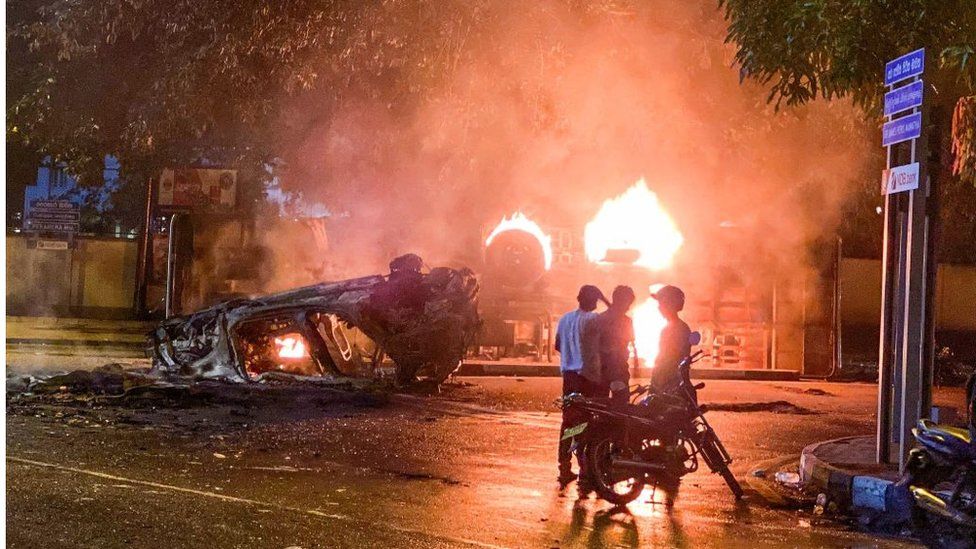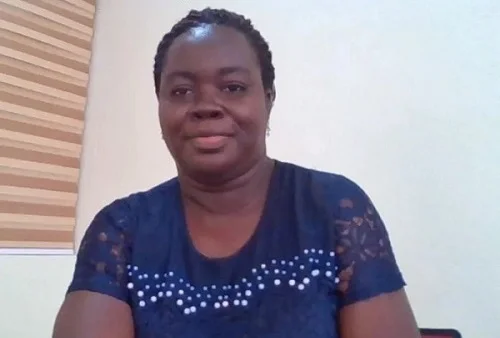Hot!
Sri Lanka tense after protesters torch leaders’ homes in night of unrest

A curfew is in force across Sri Lanka after mobs burned down homes belonging to the ruling Rajapaksa family amid mounting anger at the economic crisis.
The overnight violence capped a day of unrest that saw PM Mahinda Rajapaksa quit, but this failed to bring calm.
Crowds besieged his residence and tried to storm it – he was evacuated to safety in a pre-dawn operation amid tear gas and warning shots.
Seven people have died and more than 190 have been injured since Monday.
The island-wide curfew has been extended to Wednesday morning as authorities seek to quell the violence. Many protesters are still calling for President Gotabaya Rajapaksa, brother of Mahinda, to leave office.https://emp.bbc.com/emp/SMPj/2.44.15/iframe.htmlMedia caption, Watch: Tear gas and physical force disperse pro and anti-government protesters
Reports say more than 50 houses of politicians were burned overnight. Violence abated as day broke, although protests continued despite the curfew.
In the east, protesters gathered in front of Trincomalee Naval Base after unconfirmed reports that Mahinda Rajapaksa had gone there with family members after escaping from his Colombo residence.
Since last month Sri Lanka has been gripped by escalating demonstrations over soaring prices and power cuts.
- Why Sri Lankans want their rulers thrown out
- The divisions behind Sri Lanka’s united protests
- Sri Lankans left desperate over medicine hikes
On Monday, government supporters clashed violently with protesters in the capital Colombo outside Mahinda Rajapaksa’s Temple Trees residence, and then at the main protest site at Galle Face Green.
Police and riot squads were deployed, and tear gas and water cannon were fired at government supporters after they breached police lines and attacked protesters using sticks and poles.
Angry demonstrators retaliated, attacking government supporters and targeting ruling party MPs, including one who shot two people after a mob swarmed his car and then killed himself, according to Sri Lankan police.
As the night went on, mobs of protesters across the country torched houses belonging to the Rajapaksas, various ministers and MPs. This included a house turned into a controversial museum by the Rajapaksas in the family’s ancestral village in Hambantota in southern Sri Lanka.
Footage posted on social media showed homes enveloped in flames as people cheered.
The BBC is not responsible for the content of external sites.View original tweet on Twitter
Areas near the president’s official residence were also set ablaze, according to reports. A municipal lawmaker died in hospital after an attack on his house.
Following Mahinda Rajapaksa’s resignation, protesters attempted to breach the inner compound of Temple Trees where he was staying along with several loyalists, and set fire to a bus outside the home. Police fired shots in the air and tear gas in an attempt to disperse them.
Mr Rajapaksa was flown out of Colombo to an undisclosed location on Tuesday morning.
Elsewhere in Colombo, tensions remained high. Men armed with sticks and rods had established road blocks on the routes leading to and from the airport, and police and security forces – usually a common sight in the area – were nowhere to be seen, reports the BBC’s Anbarasan Ethirajan.

Sri Lanka is facing its worst economic crisis since gaining independence from Britain in 1948, and people are furious because the cost of living has become unaffordable.
The country’s foreign currency reserves have virtually run dry, and people can no longer afford essential items including food, medicines and fuel.
The government has requested emergency financial help. It blames the Covid pandemic, which all but killed off Sri Lanka’s tourist trade – one of its biggest foreign currency earners.
But many experts say economic mismanagement is also to blame.
Source:BBC News
Hot!
Swedru All Blacks back to winning ways, Roshan humble King Faisal

Sekondi Rospak FC made it eight wins in eight successive home games after three second-half goals from John Amoah, Joseph Ntow and Stephen Anthony Kofi. John Amoah opened the scoring in the 55th minute after a barren first half. Joseph Ntow added to the tally in the 56th minute before Stephen Anthony Kofi rounded things up in the 74th minute to give Rospak a 3-0 win over former Premier League side King Faisal.
Elsewhere at Swedru – leaders Swedru All Blacks humbled PAC Academy in an emphatic 2-0 win. Zayat Bubakari scored first for Swedru All Blacks in the 27th minute before Rudolf Junior Nana Kwasi Mensah made it 2-0 in the 34th minute. Swedru All Blacks are top of the table with 36 points – 4 points ahead of second placed Rospak FC.
Meanwhile, Former Premier League side Cape Coast Mysterious Dwarfs recorded their fourth successive home victory after beaten New Edubiase United 2-1 at the Robert Mensah Park. Enoch Odoom struck first for Cape Coast Mysterious Dwarfs in the 19th minute but Steven Asante equalized for New Edubiase United before halftime. After the interval, Godfred Eshun scored from distance in the 65th minute to help Cape Coast Mysterious Dwarfs secure all the points.
Here are the results in Zone Two

Hot!
Cervical Cancer alert: Avoid sex at early age

The Programmes Manager of Non-Communicable Diseases (NCDs) of the Ghana Health Service (GHS), Dr Mary Efua Commeh, has advised young girls to avoid sex at an early age.
This, she explained, will give the cervix the opportunity to mature before they become sexually active.
“You need to delay what we call the first sexual intercourse as much as possible to give the cervix the opportunity to mature before the person becomes sexually active,” she said.
Dr Commeh stated this in an interview with The Spectator in Accra on Tuesday as a part of the Cervical Cancer awareness month.
According to her, cervical cancer was the second leading female cancer in Ghana with a total of about 3,072 cases annually, and out of that, 1,815 deaths are recorded, representing more than 50 per cent.
She indicated that “If young girls are going to be sexually active, then you need to talk to your parents about being vaccinated.”
She explained that vaccinating young girls against human papillomavirus (HPV) has been found to be a very effective way of preventing cervical cancer.
“There are countries that started HPV vaccination years ago and they are not seeing any cervical cancers now because they would have eliminated most of the high-risk HPVs in their women. So if the high-risk HPV is not there, then obviously the results on cervical cancers are going to go down,” she added.
Dr Commmey said the HPV vaccination is recommended for young girls aged nine to 14 years, adding that it had been found to be highly effective, not just for cervical cancers but for other HPV-related cancers, such as anal cancers, cancers of the vagina, genital warts, amongst others.
She further elaborated that the idea is to put up a barrier before the HPV comes in and that once a young female encounters it, she is already protected.
She also mentioned that for cervical cancers, the main cause is called HPV infection, saying generally, all sexually active women acquire HPV at some point in their lives.
However, the Programmes Manager of NCDs at the GHS mentioned that the body has a way of clearing the HPV, explaining that it is a natural mechanism that goes on, unfortunately, there are a few women whose HPV persists.
Moreover, she noted that the numbers for Cervical Cancer tend to be much higher because at times, clients would wait, and try all sorts of medications before they finally report to the health facility saying “we actually lose some women before they get to the hospitals with over 75 per cent of the cases coming in its third and fourth stages.”
Dr Commey, therefore, called for public awareness while ensuring the availability of information for prevention and control.
By Jemima Esinam Kuatsinu







